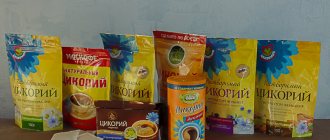Coffee is one of the most popular beverages, with more than 2 billion cups consumed every day around the world.
Disputes about its benefits and harms have not subsided for many years. At the same time, the number of people who like to enjoy the aromatic drink is only growing. Let's figure out what the beneficial properties of coffee are, and do they exist at all? We will also learn numerous myths and misconceptions that have settled in the minds of many people.
How does coffee affect the human body?
More recently, it was considered a harmful drink. He was accused of insomnia, increased blood pressure, and a negative effect on the heart and blood vessels.
Today, scientific research confirms that coffee is a unique drink containing hundreds of health-promoting chemicals, including antioxidants.
Vitamins and minerals
Coffee is rich in vitamins (B1, B2, PP).
In addition, it serves as a source of some micro- and macroelements. Contains magnesium, phosphorus, manganese, chromium, cobalt and potassium.
Caffeine
Many people know that coffee is primarily a source of caffeine.
Caffeine is an alkaloid, a psychostimulant, and generally a unique substance in many respects:
- Has a stimulating effect on the nervous system.
- Increases heart rate.
- Dilates most blood vessels (constricts only a few in the brain).
- Increases pressure slightly (by 6–8 mm). But with regular daily use, this effect on a person decreases and the rise in blood pressure stops.
- Has a diuretic effect.
For healthy people, caffeine is more beneficial than harmful . It is also found in tea, energy drinks, cola, cocoa and chocolate. The main thing is not to exceed the recommended dose. More on this below.
Theobromine
Theobromine is a precursor to caffeine, which is found in unripe coffee beans. Many people mistakenly believe that it is present in coffee and has some kind of negative effect on humans.
In fact, there is practically none of it in the finished drink. The same cannot be said about chocolate and other cocoa products, where it is contained in more significant quantities. Although there is still a lot of benefit from it.
Benefits of coffee for the body
Every year more and more beneficial properties are found in it. They manifest themselves to a greater extent with regular consumption of 3–4 cups of the drink.
Extends life
Numerous studies prove that regular moderate consumption of the drink improves the condition of the heart and blood vessels, reduces the risk of heart attacks and strokes . Scientists suggest that a temporary increase in blood pressure as a result of drinking coffee trains the circulatory system. Thus, the drink prolongs the life of men and women.
Invigorates and tones
Caffeine in the composition invigorates, relieves fatigue, improves memory.
Although, if you look at it, everything is a little more complicated than it seems. The mechanism of its action is due to the fact that it does not give a surge of strength, but simply prevents you from feeling tired . The brain has to use its untouchable energy reserves. When the effect of caffeine wears off, a person is immediately overcome by a wave of severe accumulated fatigue. Nevertheless, we can improve concentration and attention for some time with the help of a drink. You just need to give yourself the opportunity to rest after this.
Preventing diabetes
It has been proven to reduce tissue resistance to insulin, i.e., reduces the likelihood of diabetes mellitus . Decaffeinated coffee has the same effect. Flavonoids, polyphenols, lignans and other antioxidants are responsible for this.
Help the liver
Natural hepatoprotector. Extremely useful for the liver, especially if there are already any disorders (does not replace treatment). It has been proven to protect against the progression of cirrhosis to cancer .
Cancer Prevention
Scientists' assumptions that coffee can cause cancer have not been confirmed. Modern research, on the contrary, confirms that it reduces the risk of cancer of the prostate, endometrium of the uterus, liver and some other organs. Research in this direction continues.
Reduces the risk of Alzheimer's and Parkinson's diseases by 60%
Observations have shown that Parkinson's disease is much less common among coffee drinkers. In the case of Alzheimer's, it prevents the formation of pathological proteins that replace normal tissue in the brain. In the same way, the drink prevents the onset of senile dementia.
Other useful properties
- It has a mild diuretic effect, but with regular use the effect may be weakened.
- Stimulates intestinal function.
- Reduces uric acid levels, which is useful for gout.
- Slows down the formation of stones in cholelithiasis.
- Rich in antioxidants.
- Has anti-inflammatory effect.
Application in cosmetology
Today you won’t surprise anyone with coffee cosmetics. And many women at home enjoy using a homemade scrub made from coffee grounds. But this is just one of many possible ways to use this product in your home self-care routine.
Before sharing a few more original recipes, let's note that the skin experiences many of the benefits of caffeine-containing products. They make the skin smooth, give it a beautiful shade, prevent premature aging, loss of elasticity and the appearance of age spots. Such products are good at soothing inflammation, removing dark circles under the eyes and redness. Scrubs and wraps using coffee reduce cellulite by almost 17%.
Coffee masks are also useful for hair. Caffeine stimulates their growth, prevents hair loss, and makes curls more manageable and shiny. Researchers say that coffee masks can prolong the life cycle of the follicle by 33% and stimulate hair growth by almost 46%.
Coffee beauty recipes
- Scrub. Prepared from 1 part olive oil, 2 parts black ground coffee and the same amount of brown sugar. Apply with massage movements, rinse with warm water, then apply moisturizer.
- Mask for the face. Mix ground coffee, honey and natural yogurt in equal proportions. Keep it for half an hour. This product nourishes, moisturizes and enriches with useful components.
- Remedy for puffy eyes. Cool the coffee, soak a cotton pad with the drink and apply it to your eyelids. Leave for a few minutes, then rinse with cool water.
- To improve blood circulation. Iced coffee cubes are perfect for this; for a more noticeable effect, you should wipe your face daily.
- Hair Mask. Mix 1 part ground coffee and 2 parts olive oil. Leave on hair for at least 30 minutes. This product softens hair and makes it shiny.
- Hair rinse. Prepare several servings of espresso and cool. Rinse clean, damp hair with the drink, leave for a while, and then rinse with clean water. After this procedure, the hair is easy to comb, becomes soft and silky.
And these are just some examples. There are hundreds of options for homemade coffee-based cosmetics. Create your own and be beautiful.
Coffee is an amazing drink. Some cannot live a day without it, others are afraid of it as a dangerous product. It's hard to say who is more right. The truth, as we know, is in the golden mean, and a cup of coffee will certainly not harm a healthy person.
More fresh and relevant information about health on our Telegram channel. Subscribe: https://t.me/foodandhealthru
We will be grateful if you use the buttons:
Daily coffee intake
Doctors recommend up to 400 mg of caffeine per day . Remember that caffeine is also found in energy drinks, colas, tea, cocoa and chocolate.
It is impossible to say exactly how much caffeine is contained in a cup of coffee.
The variety, dosage, pre-treatment, and brewing method matter here. Therefore, it is only possible to roughly estimate its quantity.
A 300 ml serving of cappuccino contains approximately 100 mg of caffeine.
Americano (300 ml) – 160 mg.
Filter – coffee (300 ml) – 150 mg.
Espresso (100 ml) – 200 mg.
Instant coffee (1 tsp dry powder) - 40–60 mg.
Therefore, drink no more than 3-4 cups (150 ml) of the drink per day . This is the amount in the studies that allowed for maximum benefit. Excessive consumption can have a negative effect on the body.
In addition, doctors advise drinking black coffee, ideally without sugar. Various coffee-containing drinks, for example, cappuccino, may contain too much sugar and other not-so-harmful additives. In addition, it increases calorie content.
Most popular types
Coffee lovers know many coffee drinks, but seven of them are truly the most popular and most famous in the world.
Espresso. This is a strong black coffee prepared using a press and steam. A properly prepared drink will have a thick, golden-brown foam. Consume with a little added sugar (in a high-quality drink, the sugar lingers on the foam for a few seconds before sinking to the bottom).- Cappuccino. This is natural coffee with whipped cream. The correct option is a mix of equal proportions of coffee, fresh milk and milk foam. The foam is usually sprinkled with a small amount of cocoa powder or grated dark chocolate.
- Americano. This is essentially a shot of espresso added to a cup of hot water. Usually consumed with sugar and/or milk.
- Cafe latte. A mix of 1 part espresso and three parts fresh milk. Delicious sweet, with various pastries and desserts.
- Coffee with milk. A traditional French drink, somewhat reminiscent of a latte. The difference is in the proportions of the ingredients. In the French version, the ratio of components is one to one.
- Mochaccino. This is a cappuccino or latte with chocolate syrup. Often served with a top of grated chocolate or cocoa powder.
- Macchiato. It is a combination of espresso, caramel, frothed milk and vanilla.
Harm and contraindications of coffee
In some cases, there may be a negative impact on health and well-being:
- Insomnia, difficulty falling asleep and shallow sleep. The reason for this is caffeine. Therefore, doctors advise excluding all its sources after 16 hours.
- Heartburn. More often it occurs from soluble, from natural in grains it is extremely rare. If this is your case, try drinking cereal.
- Tannins in coffee can interfere with iron absorption. Therefore, it is advisable to separate intakes of iron-rich foods and caffeine-containing drinks.
- If you are hypersensitive to caffeine, there may be a prolonged increase in blood pressure, anxiety, and sleep problems. It is better for such people to limit themselves to a maximum of 1 cup, or eliminate it completely.
Signs of a caffeine overdose
Excessive coffee consumption can lead to overdose. It is accompanied by unpleasant symptoms:
- pronounced palpitations;
- increased sweating;
- anxiety;
- anxiety;
- disorientation;
- sometimes hallucinations.
There are no home remedies. If symptoms are severe, it is better to consult a doctor.
Confusion and hallucinations are more likely to occur from misuse of caffeine pills and supplements than from coffee.
However, it is best to remember that a safe dose of caffeine is up to 400 mg. But given the fact that it is not possible to determine the exact content of it in your cup, do not drink too much. This way you can definitely avoid side effects.
In addition, caffeine is also found in tea, carbonated sweet drinks, cocoa and chocolate. Take this into account.
How to safely quit caffeine
Try drinking plain water instead of cola first. Stick to this principle for a week. Have your caffeine cravings decreased? This means that the “treatment” must be continued. Now is the time to replace traditional coffee with a similar decaffeinated drink. It is also important to track portions of food consumption. Continue until your daily caffeine dose drops to 100 mg or less. Gradually giving up caffeine-containing drinks will protect you from unpleasant physiological sensations and will also be less “painful” on a psychological level.
Without caffeine, do you feel tired? Make sure you are getting enough rest per day? Better yet, check the vitamin and mineral balance in the body? Drowsiness and chronic fatigue may indicate vitamin deficiency or other health problems. But caffeine does not cure this.
Is instant coffee harmful?
You can often hear that real coffee is necessarily ground grains, and instant coffee is some kind of harmful cheap waste. In reality this is not the case. It is as natural as roasted beans. And it is made from the same quality coffee beans.
It’s just that in the case of soluble and sublimated, special technologies are used.
When producing the soluble version, the raw materials are frozen and then the water is removed by sublimation. Thus, it turns out like a concentrate.
However, during heat treatment, grains lose odorous compounds. In this regard, in the production of such coffee, special oils are often used to add flavor. It’s just that expensive varieties of coffee use natural oils, and cheap ones use synthetic ones. Therefore, the aroma will be slightly different.
When producing freeze-dried food, the technology is more gentle. This means that flavorings are used much less frequently.
Thus, the instant version is in no way inferior to ground grain. It has the same positive properties, the same composition. Although it contains a little less caffeine, it still contains a lot.
Therefore, if you like an invigorating drink, it is quite possible to enjoy your favorite taste without wasting time and effort on preparing the grain.
Harsh production statistics
Let's look at the statistics of coffee production around the world from 2001 to 2015. Data is in thousands and 60 kilogram bags.
Information taken from the open source International Coffee Organization.
In order to visually see the dynamics, let's build a diagram .
The numbers reflect the scale of coffee consumption.
A pattern can be drawn: when the world economy is in a fever, the demand for coffee grows and, as a result, its production.
Who can and cannot drink coffee
During pregnancy
Previously, it was believed that pregnant women should absolutely not drink coffee. However, the study did not confirm a negative effect on the fetus. It does not cause any defects. Today, doctors take a more loyal approach to this issue and allow drinking a drink beloved by many during pregnancy in all trimesters.
However, caffeine passes through the placenta and enters the fetal bloodstream. May cause increased heart rate and increased mobility of the child.
And also in pregnant women, especially in the third trimester, caffeine metabolism slows down. Therefore, its permissible norm is up to 200 mg, which corresponds to 1–2 cups of drink per day.
When breastfeeding
According to doctors, a nursing mother can drink coffee. However, in the first months of a newborn’s life, you should be extremely careful with nutrition in general, and with coffee in particular. Any product should be introduced gradually and a little at a time. And only in the absence of any reactions of the child’s integument can it be added to your diet.
As for coffee, when consuming it, you need to carefully monitor the child’s behavior. Some children are very sensitive to caffeine and become irritable and have difficulty sleeping.
In this case, it is better to reduce the amount of drink. By 3-5 months of age, children's sensitivity often decreases.
In any case, your permissible daily intake is up to 200 mg of caffeine, that is, up to 2 cups per day .
For children
There is not a single study that would confirm at least some benefit of the drink for children.
Caffeine greatly excites the child’s nervous system and increases the number of heart contractions. And also, as mentioned above, it has a diuretic effect, which is also of no use to the child. Doctors do not have a consensus on the consequences for the child’s body. It is believed that excess caffeine may be harmful to the immature nervous system.
For this reason, coffee is not recommended for children and adolescents. Although some doctors allow up to 45 mg of caffeine per day from 5-6 years of age. But there are many sources of caffeine: chocolate, cocoa, tea, some carbonated drinks.
For high blood pressure
Very often, doctors prohibit coffee for hypertensive patients. If you drank coffee for the first time, your blood pressure may rise slightly. If this drink is familiar to you, then hypertension —
not a contraindication, but rather an indication. Coffee has the most beneficial effect on blood vessels and the heart. Numerous studies have proven that it reduces the risks of heart attacks and strokes.
Some cardiologists even recommend that people with high blood pressure, heart and vascular diseases drink the drink regularly.
However, individual sensitivity is very important. If you drink coffee and feel good, you can drink it. But, no more than the recommended dose for everyone.
Moreover, regular consumption of the drink reduces the likelihood of hypertension.
When losing weight
When it comes to weight loss, many people think of green coffee.
Green coffee is not roasted coffee beans. Its usefulness is associated with a large amount of chlorogenic acid. It has powerful antioxidant properties, as well as a fat-burning effect. However, its fat-burning effect is very weakly expressed.
Therefore, you should not count on the effectiveness of the drink in this case.
As you know, only a calorie deficit will help you lose weight. And no other tricks will give a long-term effect.
Research has shown that green coffee extract can also lower blood glucose levels and have a beneficial effect on blood pressure. Perhaps in the future we will learn even more about its healing properties.
Myths about coffee
Causes dehydration
Many people, including some doctors, still believe that after a cup of an invigorating drink you should drink a glass of water. In fact, this is not true. Each cup contributes to the total volume of liquid a person needs daily.
And there is no need to force water into yourself. As always, go by your thirst.
The diuretic effect is more typical for beginners. If you drink coffee regularly in moderate quantities, you are unlikely to feel anything like this.
When consuming high doses of caffeine, there will indeed be a sharp increase in urine. But high doses are not recommended under any circumstances.











